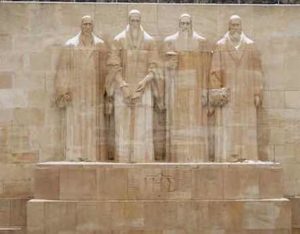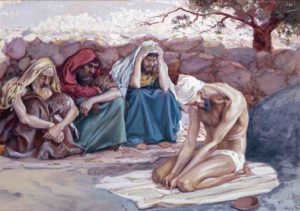“The righteous will live by his faith”, also a challenge for Christians tempted by regress
The writer of the Letter to the Hebrews (10.38) reproduces the text of Habakkuk, “The righteous will live by his faith” with the inspiration of a writer of the New Testament.
The situation of the Christians whom he addresses, is fairly close to that of the Old Testament prophet and his contemporaries. These are Christians tempted by regress or turning back, in a Church in crisis faced with a hostile world.
Remember instead those earlier days after you had received the light of God, when you stood your ground in a great contest in the face of suffering. Sometimes you were publicly exposed to insult and persecution; at other times you stood side by side with those who were so treated. You sympathized with those in prison and you joyfully accepted the confiscation of your property, because you knew that you yourselves had better and lasting possessions
Cast not away therefore your confidence: it will be richly rewarded.
You need to persevere so that when ye have done the will of God, you will receive what he has promised.
In just a little time, a little bit of time,
he who is coming will come will and will not delay. But my righteous one will live by faith, and if he shrinks back, I will not be pleased with him.
But we are not of those who shrink back and are destroyed, but of those who believe and are saved.
Hebrews 10. 32-38
The author of Hebrews is addressing Christians living in a situation of persecution. They are tempted by regress, turning back.
He calls them to think, to remember the example they have given themselves.
Faithfulness in persecution
He first recalls the past loyalty of the community (v. 32-34) “Remember”. Then he calls for perseverance (35-39 “Do not give up”) this Christian community to which is promised the fulfillment of the great promise of Habakkuk.
These newly converted then quickly persecuted Christians are originally Jews assimilated into the Jewish colony that lives in Rome.
During the first century AD, in the Roman Empire, Christians were not yet differentiated from Jews. The Jews had a relatively favorable legal status. Judaism was a legal – permitted – religion. But according to the testimony of a Latin author “As the Jews constantly caused disturbances at the instigation of Chrestus – probably a reference to Christ – the Emperor Claudius expelled them from Rome” in 49. Aquila and Priscilla, the Apostle Paul’s colleagues were in their number (Acts 18.2)
There’s probably been some agitation and unrest between Jews who converted to Christianity and Jews who opposed it violently. We should not be surprised when we read in the book of Acts the upheavals caused against Paul and the new converts.
Already from 41 on restrictions, harassment begin: the gatherings are prohibited, but Christians still continue to meet, and they are cast into prison, their property is confiscated. …
“They are exposed publicly (made an exhibition) to insults and abuse”: pagans attribute them vices and horrible practices; Jews accuse them of being responsible for their problems.
These Christians not only hold out, but they bear witness of solidarity with those who are persecuted, they have compassion – surely in a practical way – with those who are imprisoned.
They are stripped of their property: their homes are confiscated by the judges, or squatted and even vandalized after they are cast in prison or banished into exile. Their furniture and their personal items are stolen, scattered in the streets, destroyed …
But these Christians, stripped of their properties, of their worldly goods (34b), know they have better possessions (34c), better goods that last forever. “Do not store up for yourselves treasures on earth …. but in heaven. ” Matthew 6.19-20.
But discouragement and temptation to turning back
However, by dint of trials, fatigue, discouragement eventually overcome them and make their havoc. The author knows what temptation they face: either withdrawing and going back to Judaism in order to escape persecution,
or maybe keeping a low profile, cutting oneself off the world …
The author of the letter warns and encourages them: Do not throw away your confidence, it will be richly rewarded.
This confidence, this boldness, the Christian develops it by trusting in the grace of God which helps him to live out his salvation in practice. Beyond the difficulties he can direct his thought, his hope towards the promised eternal rewards. But the point is not to dream, to wait for heavenly life on earth, through inaction …
No, it takes perseverance, endurance, courage to continue anyway, not to give up everything. It takes courage to follow the example of Christ, to go on proclaiming the Word, to live out the Gospel in a hostile or indifferent environment.
Persecutions of the past in the present time: circus in Rome, dragonnades in the French Cévennes mountains, genocides, imprisonment, assassinations because of faith …
But also the atmosphere of the world today: all kinds of spirituality are equal, “you have your truth, I have mine.” “All religions are good, provided that we practice them…” … but mostly not too much! “Religion belongs to the private sphere” …
Why are boldness and perseverance required from the community which is looking for the fulfillment of God’s promise? The author will explain. Like all the New Testament writers he quotes Habakkuk in its Greek version with some inspired changes …
Habakkuk reexamined
“For in just a little time, a very little while, he who is coming will come and will not delay.
But my righteous one will live by faith;
And if he shrinks back, I will not be pleased with him.”
He first adds Isaiah 26.20 “a little longer, a little more time” as an invitation to perseverance
The announced vision becomes “the one who is to come, he will come and will not tarry. ” This is an absolutely certain event: the glorious return of the Lord.
Fidelity, walking forward or withdrawing backwards?
Two attitudes are then put in opposition: fidelity, walking forward or desertion, withdrawing
The righteous will live by faith, a faith which began at conversion and which continues over time, a faith which demonstrates its faithfulness to Christ against the difficulties, against suffering, and even against the lack of deliverance, as it happened to many heroes of faith in chapter 11.
“But if he shrinks back, (withdraws), I will not be pleased with him.”
He who retires is “one who falters, who fails”
A mortal risk
The author also warns those tempted to escape the suffering and the disappointment by falling back on themselves, hiding, in isolation from the community. For him, it is the open road to the betrayal, to the regress
“We are not of those who shrink back and are destroyed, but of those who believe and are saved.”
This warning against regress seems severe for Christians in crisis … But for them the author expresses a passionate pastoral interest. He joins them by “we”, he proclaims his certainty that they will persevere in spite of all and will keep faith, persistent loyalty, until they meet with the Lord.
To be continued
C. S.



